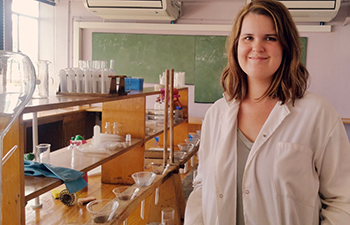Latest News Archive
Please select Category, Year, and then Month to display items
12 October 2020
|
Story Arina Engelbrecht
|
Photo Supplied
 Arina Engelbrecht from Organisational Development and Employee Well-being believes physical activity has a number of benefits for one’s health, including stress relief.
Arina Engelbrecht from Organisational Development and Employee Well-being believes physical activity has a number of benefits for one’s health, including stress relief.
Being physically active plays a big role in preventing the development of mental-health problems and in improving the quality of life of people experiencing mental-health problems.
Treatment for depression
Physical activity can be an alternative treatment for depression. It can be used as a stand-alone treatment or in combination with medication and/or psychological therapy. It promotes all kinds of changes in the brain, including neural growth, reduced inflammation, and new activity patterns are formed that promote feelings of calm and well-being. It releases endorphins – powerful chemicals in the brain that energise your spirit and make you feel good.
Physical activity can be very effective in relieving stress. Research in adults has found that physically active individuals tend to have lower stress levels compared to individuals who are less active. It also leads to improved sleep. When a person sleeps better and feels more rested, overall quality of life improves. They cope better with daily life stressors.
Reduce Alzheimer's risk
Regular physical activity can reduce your risk of developing Alzheimer's disease by up to 50%. It can also slow down further deterioration in those who have already started to develop cognitive problems. It stimulates the brain’s ability to maintain old connections as well as to make new ones.
A study asked people to rate their mood immediately after periods of physical activity (e.g. going for a walk/run, cycling, doing housework) and periods of inactivity (e.g. reading a book or watching television). Researchers found that participants felt more content, more awake, and calmer after being physically active compared to after periods of inactivity.
In conclusion, people who are physically active feel a sense of well-being, feel more energetic throughout the day, sleep better at night, have sharper memories, and feel more relaxed and positive about themselves and their lives.
“Being physically active not only changes your body, it changes your mind,
attitude, and your mood.” – Arina Engelbrecht
Postgraduate student to conduct research on maize quality at Michigan State University
2017-03-27

Schae-Lee Olckers, master’s student in the
Department of Microbial Biochemical and
Food Biotechnology.
Photo: Supplied
Schae-Lee Olckers, a master’s student in the Department of Microbial Biochemical and Food Biotechnology at the University of the Free State (UFS), will be travelling to the US in a few weeks’ time. For the next two years she will be doing research at the Michigan State University (MSU) at its Department of Food Science, working on wheat quality and its baking properties.
Increase the nutritional value of maize
The title of her master’s research project is: “The influence of low and optimal nitrogen conditions on the nutritional value of quality protein maize”. She is focusing on the influence of environmental conditions on the nutritional value of maize.
New hybrids of maize production developed
Olckers said: “I chose to start my research on this specific topic in my honours year because maize is the main staple crop in South Africa, as well as in the rest of Africa. Therefore, micronutrient malnutrition is a major concern for developing countries as well as for poor people who rely on it as a major food source. I found it interesting that these breeding programmes that are being developed for new hybrids of maize for production are focusing on increasing the nutritional value of maize and can therefore help eliminate micronutrient malnutrition in some populations of poor communities,” she said.
Prof Perry Ng will be her research supervisor. He is an affiliated professor at UFS in the division of Plant Breeding. “I am very excited about the opportunity to travel and to gain experience working with a well-known cereal scientist. The work he does is also closely associated with my research,” said Olckers.
Her supervisors at UFS are Profs Garry Osthoff and Maryke Labuschagne from the Departments of Microbial Biochemical and Food Biotechnology and Plant Sciences respectively.